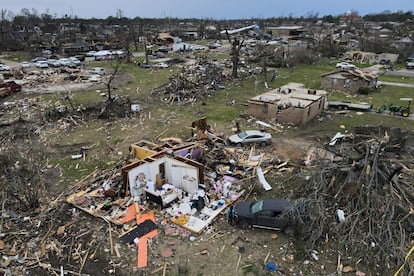Insurance companies in the United States back down amidst the increase of climate catastrophes
Two firms will stop offering coverage in risk areas in California, sparking debate over company limits and homeowners’ rights


In mid-May, along with her cat Cyrus, Sassan Darian visited the ruins of her home. Her house was consumed by flames, along with others, in a fire that lasted six days and burned 80 hectares in a residential area of Orange County. The worst nightmare of homeowners in Southern California became her reality. Last month, a month after the disaster, Darian returned to the zone to prepare the reconstruction of the home built by her father. The project would be almost impossible without the insurance payout. Now it will be more difficult for residents to find protection in a complex real estate market greatly affected by climate change.
Two giants of the insurance industry in the United States have announced that they are reducing their services in California, which suffers from a wildfire season that lasts at least six months. State Farm, a company that has been in business for more than a century, said that it has stopped selling accident protection to individuals and small businesses in the largest market in the country. The company justifies the decision based on the “historic increases in construction costs,” greater and more rapid exposure to catastrophes and the difficult industry environment.
After that announcement, Allstate informed the local regulator that since last November it has stopped selling new coverage for homes in California, which has at least 1.2 million homes in zones at risk of fire. “The cost to insure new home customers in California is far higher than the price they would pay for policies due to wildfires, higher costs for repairing homes, and higher reinsurance premiums,” a company spokesperson wrote in a message.
Allstate’s disclosure came along with a request. The company, the fourth largest in the state, was seeking authorization to increase its prices by 40%, some $720 million, for those who are still customers, despite offering the highest deductibles in the market. California is now the only state where the company does not issue new contracts. Proposition 103, a local law passed in 1988, prohibits insurers from changing their rates without the approval of the state insurance commissioner. State Farm is also seeking a 28% increase in the cost of policies for homeowners and a 20% increase for renters.

The changes made by these two companies do not put buyers of new residences at risk, but they do impact a hot real estate market. There are a hundred insurance companies working in the region. In addition, the state government offers a plan that provides affordable protection to those living in high-risk areas. As of last year, it covered some 272,000 homes.
The fact begs the question of whether this points to a national trend, as is often said when it comes to California. “It may be a signal that some areas will become uninhabitable, a bad omen for residents,” says Lisa Dale, a Columbia University professor and author of the book Climate Change Adaptation, published by the New York University. Dale believes that continued coverage for homeowners in high-risk areas can be a bad thing. “The danger may become less visible, and people may not understand the threat they face.”
Fires are not the only things putting Californians at risk. Rising sea levels threaten the existence of coastal towns, which are vulnerable to powerful storms. The state is also located in a highly active seismic zone. In addition, cities such as San Francisco and Los Angeles have documented an increase in property crime. “If companies are using timely information in their algorithms to conclude that it’s no longer profitable to do business in California, it’s a very important signal to the market,” Dale adds.
“Climate change is, among other things, the biggest problem in decades for the insurance market,” says Dr. Marco Tedesco. The Columbia Climate School expert believes that the model currently employed by insurers is “unsustainable” and destined for failure, as there is no historical information from regions that have recorded unexpected weather events.
“Things can change very quickly once large corporations get the ball rolling on market transformation,” Tedesco adds. In Colorado, 76% of insurers reduced their number of clients in order to cope with wildfire damage. This reduced competition and strengthened the dominant role of five large companies.
Some Louisiana insurance companies became insolvent as claims accumulated from customers following hurricanes Delta, Laura, Zeta and Ida, which occurred between 2020 and 2021, despite the fact that hurricane damage is easier to estimate because of weather forecasts. The behavior of fires and floods is more difficult to anticipate.
Consumer organizations in California have asked local authorities to order State Farm to reverse its decision. “If the commissioner lets the company get away with this, others will follow. The result will be an artificial lack of coverage and increased pressure on the regulator to approve huge premium increases without scrutiny,” said Harvey Rosenfield, president of Consumer Watchdog. The group says State Farm has increased rates at a rate of 6.9% per year over the past five years for existing customers. The payout they make after claims is also lower than in other parts of the country, according to Rosenfield. While in other regions they pay 66 cents for every dollar they take in, in California it’s 45 cents.
Sign up for our weekly newsletter to get more English-language news coverage from EL PAÍS USA Edition
Tu suscripción se está usando en otro dispositivo
¿Quieres añadir otro usuario a tu suscripción?
Si continúas leyendo en este dispositivo, no se podrá leer en el otro.
FlechaTu suscripción se está usando en otro dispositivo y solo puedes acceder a EL PAÍS desde un dispositivo a la vez.
Si quieres compartir tu cuenta, cambia tu suscripción a la modalidad Premium, así podrás añadir otro usuario. Cada uno accederá con su propia cuenta de email, lo que os permitirá personalizar vuestra experiencia en EL PAÍS.
¿Tienes una suscripción de empresa? Accede aquí para contratar más cuentas.
En el caso de no saber quién está usando tu cuenta, te recomendamos cambiar tu contraseña aquí.
Si decides continuar compartiendo tu cuenta, este mensaje se mostrará en tu dispositivo y en el de la otra persona que está usando tu cuenta de forma indefinida, afectando a tu experiencia de lectura. Puedes consultar aquí los términos y condiciones de la suscripción digital.








































